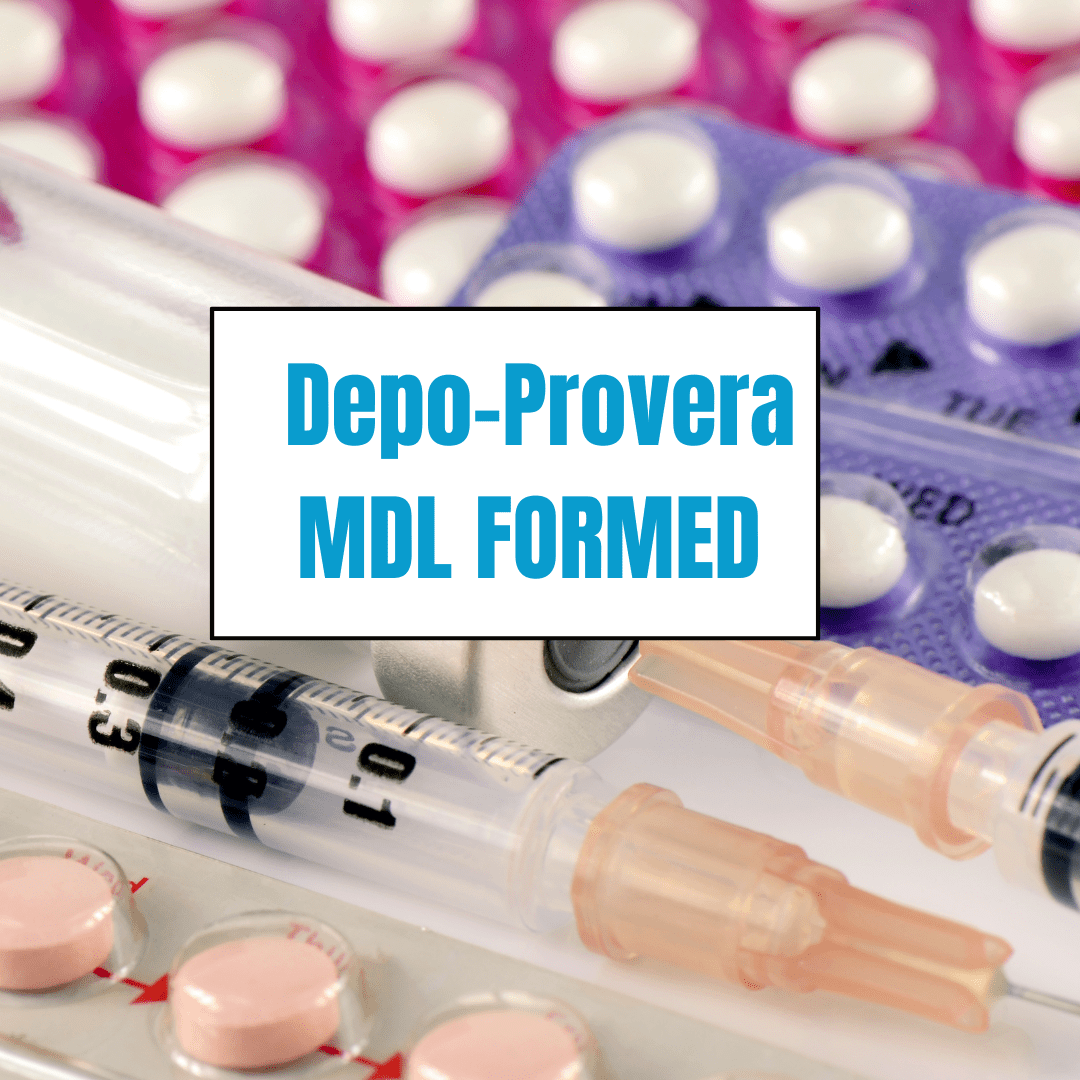Depo-Provera Litigation Update
To date there are 550 active cases in the MDL filed against the drug manufacturer Pfizer by women alleging that they have developed brain tumors after using the injectable hormonal contraceptive Depo Provera. The cases have been consolidated in the Northern District of Florida and are being managed by U.S. District Judge M. Casey Rodgers.
On May 29, Pfizer had filed a petition asking the Philadelphia Court of Common Pleas to consolidate two Depo Provera lawsuits representing 100 plaintiffs pending in that jurisdiction; however on May 30, the court issued an order severing and dismissing all the claims but one, ruling that the plaintiffs in the group lawsuit could not proceed as a single case. This left only one plaintiff who later withdrew her claims. On June 5, Pfizer withdrew its petition without prejudice, eliminating the need for a Philadelphia consolidation.
In a pre-trial order dated July 16, Judge Rodgers issued a certification of case inventory requirement for the plaintiffs’ leadership firms, requiring those counsel to certify to the court the number of unfiled Depo Provera cases in the firm’s inventory by July 31, 2025. The order further stated:
“If these law firms file a vastly disproportionate number of cases after the Court’s ruling on preemption (assuming Plaintiffs’ claims survive), the firms will be ordered to file a second certification to explain what was done to investigate the claims and proof of use/injury, and when those efforts were made. Based on those certifications, the Court will consider whether counsel from those firms should be allowed to remain in a Leadership position.”
At the June Case Management Conference, counsel for both the plaintiffs and defendants asked Judge Rodgers to approve a new schedule designed to keep all facets of the litigation on track. At the conference on August 22, Pfizer filed its Motion for Summary Judgment, arguing that the MDL should be dismissed on the basis of federal preemption because in 2024 the FDA rejected the defendant’s proposed label change warning of the risks of developing brain tumors. In addition, the judge issued an order requiring the lead plaintiffs to disclose the number of cases that remain unfiled in their inventories. The next Case Management Conference has been set for September 29, 2025, with oral arguments on preemption to follow.
Gain additional insights into the Depo Provera litigation from our recent mass tort webinar:
Depo-Provera Litigation Update: Pfizer Requests Mass Tort Coordination in Philly Courts
According to a recent article on Law.com, Pfizer has petitioned the Philadelphia Court of Common Pleas to consolidate lawsuits involving its injectable contraceptive drug Depo-Provera. Plaintiffs allege the drug causes benign brain tumors called intracranial meningiomas. Although only two lawsuits have been filed in Philadelphia to date, one case includes claims from more than 100 plaintiffs. After a recent court order severed the plaintiffs in that case, Pfizer anticipates that many of those individuals will refile their claims separately in Philadelphia.
Pfizer argues that a mass tort program would promote judicial efficiency and facilitate a coordinated approach to the expected influx of cases. If approved, this would be the third mass tort designation in Philadelphia this year, following similar designations for hair relaxer products and Johnson & Johnson talcum powder.
Nationally, litigation over Depo-Provera has grown following a 2024 British Medical Journal report linking the drug to a 550% increased risk of intracranial meningioma. A federal multidistrict litigation has also been established in the Northern District of Florida, with approximately 350 cases pending.
Pfizer maintains that the claims lack merit and stands behind the safety and efficacy of Depo-Provera.
In other news related to Depo-Provera, at the third case management conference held in the multi-district litigation, counsel for plaintiffs advised presiding Judge M. Casey Rodgers that they are close to dismissing three manufacturers of the generic form of the drug. Prasco Laboratories, Greenstone LLC and Viatris Inc. All submitted affidavits claiming noninvolvement in the production of the drug. (taken from Law360.com)
Let’s Connect:
Interested in learning more about the Depo Provera MDL and how your firm can stay ahead? Let’s schedule a time to discuss how Verus can support your litigation strategy.
On January 30, 2025, the JPML hearing confirmed the formation of an MDL for Depo-Provera. The debate over venue selection remains, with plaintiffs advocating for California, given the majority of filed lawsuits.
What is Depo-Provera?
Depo-Provera is the brand name for medroxyprogesterone acetate, an injectable form of contraception. Administered every three months, it provides a long-lasting and effective birth control method.
Pfizer has profited significantly from the drug, with 24.5% of sexually experienced women using Depo-Provera in the U.S. between 2015 and 2019. Initially developed for cancer treatment, Depo-Provera faced multiple FDA rejections over safety concerns before approval in 1992.
How Depo-Provera Works
Depo-Provera prevents pregnancy by:
- Suppressing ovulation
- Thickening cervical mucus to block sperm
- Altering the uterine lining to prevent implantation
However, plaintiffs claim Pfizer failed to warn users about the risks of brain tumors, particularly in light of a lower-dose alternative known as Depo-SubQ Provera 104, which has a significantly lower risk of meningioma.
Key Questions for Investigation:
Why did Pfizer maintain a high 150 mg dose when lower-dose alternatives existed?
Did Pfizer conduct clinical trials to assess the effectiveness of lower doses?
Was the higher dose truly necessary for contraception, or were other factors at play?
For law firms pursuing Depo-Provera litigation, a well-structured strategy is essential. Verus offers expert support in claimant validation, data analysis, and case management to help build a strong foundation for your cases.
Partner with Verus today to develop a strategic approach, uncover key evidence, and streamline your litigation efforts.
Depo-Provera Brain Tumor Risks
Calling meningiomas “benign” understates their impact. These tumors can quietly grow in the brain, causing seizures, vision loss, and cognitive impairments. Even with successful surgical removal, lasting effects include chronic headaches and the need for continuous monitoring.
A March 2024 British Medical Journal study of 18,000 French women found that those who received Depo-Provera injections for over a year had a 550% increased risk of developing intracranial meningiomas.
Scientific Link Between Depo-Provera and Meningioma
Depo-Provera contains high levels of synthetic progestin, a hormone that mimics progesterone. Meningiomas express hormone receptors for progesterone and estrogen, and research suggests that prolonged exposure to high doses of progesterone over-activates these receptors, fostering tumor growth.
A dose-response relationship underscores the risk: the more injections a woman receives, the higher her likelihood of developing meningioma. Cases involving a single injection are rare, as synthetic progestin exposure accumulates over time. Many women who used Depo-Provera for 15+ years have reported symptoms consistent with meningioma diagnoses, aligning with scientific research linking prolonged hormone exposure to other cancers, such as breast and uterine cancer.
Depo-Provera Usage and Brain Tumor Risk Estimates
Approximately 2-3 million Depo-Provera prescriptions are filled annually in the U.S. The baseline incidence of meningioma is 9.5 per 100,000 people per year. Given a 5.5-fold increased risk, for every 100,000 Depo-Provera users, approximately 52.25 cases of meningioma could develop each year.
Understanding the full scope of claimants in the Depo-Provera litigation is critical. Verus offers data-driven analytics to help law firms assess claim trends, identify key litigation insights, and optimize case strategies.
Leverage Verus’ powerful analytics to quantify and manage Depo-Provera claims efficiently.
Depo-Provera Lawsuit Allegations Against Pfizer
Despite mounting scientific evidence, Pfizer failed to warn consumers about meningioma risks. Drug manufacturers are legally required to disclose known risks, but Pfizer left out meningiomas from its label, prioritizing profits over patient safety.
The long-standing link between progesterone and meningiomas should have triggered stronger post-market safety monitoring. Plaintiffs argue that had they been warned, they would have chosen alternative birth control options.
Navigating the complexities of Depo-Provera litigation requires efficient case management to track plaintiffs, medical records, and legal strategy. Verus provides streamlined solutions to help law firms manage high-volume litigation with advanced analytics and case tracking tools.
Partner with Verus to optimize your Depo-Provera lawsuit case management and ensure your firm stays ahead in this emerging litigation.
Depo-Provera Litigation Timeline
- 1992 – FDA approves Depo-Provera
- 2024 – BMJ study links Depo-Provera to a 550% higher risk of meningiomas
- Early 2024 – Nearly 70 lawsuits filed
- Plaintiffs’ Request – Cases consolidated in California, Massachusetts, or Florida
- Pfizer’s Proposal – Cases in Southern District of New York
- February 7, 2025 – MDL assigned to Judge M. Casey Rodgers (Northern District of Florida)
Judge Rodgers’ Experience – Previously oversaw 3M earplug MDL (largest mass tort in U.S. history)
Estimated Depo-Provera Meningioma Cases
A recent estimate projects that the number of potential Depo-Provera meningioma cases falls between 16,651 and 18,156 for progesterone receptor-positive cases, with a broader estimate ranging from 27,752 to 30,261 total cases within the 18-55 age demographic.
This projection focuses on cases where the causal link is more immediately evident based on existing scientific data. Women who used Depo-Provera within a defined timeframe and were subsequently diagnosed with meningioma may have a more straightforward burden of proof than those who used the drug earlier in life and developed tumors decades later.
However, litigation success requires more than biological plausibility. Plaintiffs must demonstrate clear causation, which will be contested in court. Challenges include individual risk factors, medical documentation gaps, and alternative explanations for tumor development.
Partner with Verus for Case Management
Verus supports law firms in handling Depo-Provera MDL cases with advanced case management solutions. Contact our end-to-end case management support team to enhance your mass tort case handling.
ABOUT VERUS:
Verus is an innovative litigation support services firm providing end-to-end litigation support to mass tort and class action law firms nationally. Our offerings include a full suite of services, including Case Management and Medical Review Services, Settlement Administration, Business & Advisory Services, lead generation and Analytics. Since 2004, Verus has administered over 8.5 million personal injury claims and disbursed over $8 billion dollars in settlement funds. For more information, contact us at 1-888-681-1129 or at Our website.
Verus provides comprehensive claimant validation, data collection, and case management to streamline your litigation process. Our team ensures accurate verification, reducing administrative burdens while improving efficiency and compliance.






